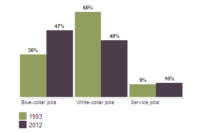Little choice but to pay
Aguilar said he has been a raitero for seven years. Like many others, he said he started as a temp worker himself, packing video games for Sega. Another raitero asked him to help drive one of his vans, and soon after, Aguilar said he borrowed $1,000 from a temp agency, now out of business, to buy his own van. Eventually, he bought a school bus.
He and other raiteros recruit workers by advertising in check-cashing stores and by word of mouth. When workers call, they are told to come to Aguilar's house to fill out Select Remedy's application. The sign on the front door of his building says in Spanish, "Señor Rigoberto lives on the second floor. If you come looking for work, go upstairs."
Castro originally applied to Select Remedy through Aguilar's brother, Eugenio Aguilar, who is also a raitero, and went to work for Xentris Wireless, a company she knew as los celulares, packing iPhone cases and other accessories. She said Eugenio sent her to Rigo's house, where she paid $5 to apply online. Rigo said people can come and use his computer, but he doesn't charge.
Every day, the temp agencies call the raiteros, giving them the number of people they need for the next shift. The raiteros then pick the workers, tell them where and when to meet and drive them to the warehouse or factory.
Nearly 50 workers said they have little choice but to pay the ride fee. Several workers said they had their own cars, but their temp agency told them they had to go with the raitero. "There was a lot of pressure to use Rigo," said Elizabeth Bellido, who worked for Select Remedy at Ty until March. "The first people who would get picked to work would be his people."
Other workers said they were allowed to drive, but soon found that the raitero had given their spot to someone else.
Castro recalled working with a raitero named Cirilo, who was ferrying workers on behalf of the temp agency Most Valuable Personnel, or MVP. One day, Castro said, Cirilo tried to cram 44 people into two 15-passenger vans.
"They wanted me to sit on the lap of another woman," Castro recalled. So she asked for a ride back from another raitero, who also served the plant and had a milk crate to sit on.
In retaliation, she said, Cirilo confronted her and told her she would never get work from him again. "If you work with another raitero, your raitero won't take you anymore," Castro said.
Cirilo declined an interview and hung up on a reporter.
MVP said it was unaware that Cirilo was charging the workers and said that it would investigate. While Select Remedy said it doesn't pay raiteros, MVP operations manager Darron Grottolo said his company has been paying Cirilo Peralta Transportación $1,350 every week to transport workers to his client companies. Hearing that workers said that they also paid Cirilo, Grottolo said, "It's disturbing. It's against the law. It's wrong." He explained, "You can't charge for transportation in Illinois."
This January, told by Aguilar that she had work, Castro came to the corner of 26th Street and Drake Avenue with about 50 others before dawn. She walked through an alley behind a blue-neon-lit dentist clinic and a shop selling quinceañera dresses and got on Aguilar's school bus. The bus took her 30 miles down Interstate 55 to the far southwest suburb of Bolingbrook, where the Ty warehouse is located.
A weekly paycheck from January for her work at Ty shows her take-home pay was $291.07, the state minimum of $8.25 an hour, minus taxes. Not mentioned on the pay stub, though, is the $40 she had to pay Aguilar to get to work that week. With those deductions, Castro's actual pay was $7.22 an hour.
Aguilar said if workers didn't pay him for the ride, they would still have to pay for gas or the bus. Select Remedy said in a written response that workers can get to a worksite any way they want.
"The cost of transportation to the job site, whether it is for public transportation, the cost of gas or maintenance on the associate's personal automobile, or any other cost, is not a deduction from wages," the company wrote.
Some raiteros deploy a network of drivers, many of whom work as temps in the factories themselves. Aguilar said he pays his drivers $100 a week. But several drivers for other raiteros said they don't get paid. Their compensation is not having to pay for the ride to work. The workers they drive still pay the raitero.
One raitero said the temp agency itself pockets the workers' transportation fees. Gabriel Espinoza said the only money he makes is the $8.25 an hour he gets as a temp for Triune Logistics at Fresh Express. He drives a van made for 15 people but says Triune has asked him to carry as many as 18 people. "It's not my van. It's the office's," he said, referring to Triune. "The temp workers pay the office through the check-cashing place."
Triune CEO Alfred Garza denied that the company has vans or charges workers. "I feel like we're doing the right thing and bending over backward for our employees," he said. "And we get thrown in with the whole industry as doing things the wrong way."
'Rigo's checks'
Until recently, Aguilar would pick up the workers' paychecks at Select Remedy and bring them to the 26th and Central Park Currency Exchange, a Western Union agent in Little Village, on Friday afternoons. The check-cashing store sometimes dedicated a window for "Rigo's checks."
On each check, Aguilar would write how many days the worker owed him for rides so the cashiers knew how much money to take out when changing the check.
"It's a convenience they" — the raiteros — "are offering to the people, and they asked if we would help them out," manager Rudy Polheber said. "People come in, we deduct the driver's fee, makes it easier for the driver."
For cashing their checks there, the workers get charged a reduced rate, $1 plus 1 percent of the check, he said.
Castro and others said they felt forced to cash their checks at the currency exchange. When they asked the store if they could pay for rides separately and get their checks without cashing them, the cashiers refused, they said.
"How is it they want to charge us more money?" asked Sandy Lopez, who worked at Ty for Select Remedy last fall. "I have my account at the bank. They don't charge me anything."
She said when she complained to Aguilar, "He said, 'This is the last time I'm going to leave you the check there, but I'm not sure I'm going to have a job for you.'"
Polheber explained that they're not in the business of handing out paychecks. "We don't want to provide that service. We get no benefit other than tying up the lines for the people who do want to cash their checks here."
Aguilar said that when workers don't want to cash their checks at the currency exchange, he picks them up the following Monday, and workers can come to his house with the transportation fee to get their check. He said he has never withheld a job over check cashing.
Around the time ProPublica began asking workers about Select Remedy, the temp agency stopped giving the checks to Aguilar. Instead, a Select Remedy representative began passing out checks as the workers were leaving Ty. More recently, the agency has been depositing the workers' wages on debit cards.
In addition, Aguilar said Select Remedy no longer calls him and tells him how many people they need for Ty. "The work that I used to do looking for people, they're doing that now," he said. "They call people," who then call Aguilar for a ride to work, still paying him $8 a day.
Despite Select Remedy's changes, nearly all the other raiteros still pick up checks from the temp agencies and bring them to check-cashing stores.
The system often results in lost checks and workers not getting paid. But when problems occur, workers who complain to the temp agency say they are often told to work it out with the raitero.
Juan Rodriguez Trujillo was waiting outside H Services Exchange on 26th Street one Friday night earlier this year, complaining that he hadn't been paid for a week he worked at a chocolate factory more than a month ago. He said he was waiting for his raitero, Cirilo, to bring the check. Asked why he didn't go to the temp agency, Rodriguez said he did, but the agency, MVP, told him to wait at the check-cashing store for Cirilo.
"They think it's easier but it creates more problems," Castro said. "You go to the raitero and they tell you to call the agency. You go to the agency and they say we already gave your check to the raitero. They treat us like a ball that they pass back and forth."
MVP said it wasn't aware of such a practice and has specific procedures for employees to pick up their checks at the agency with an employee ID.





